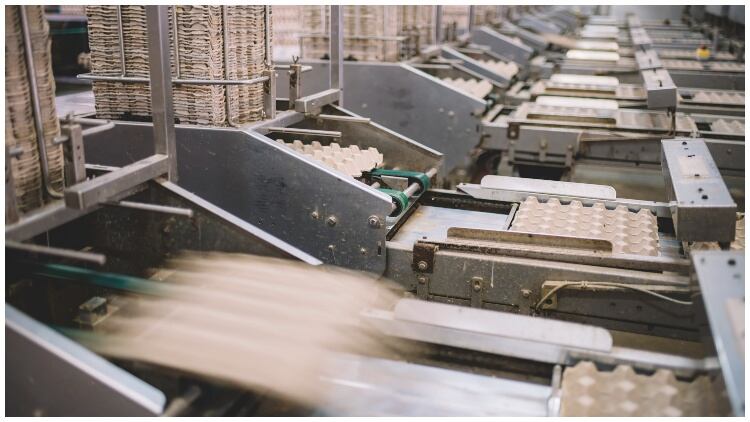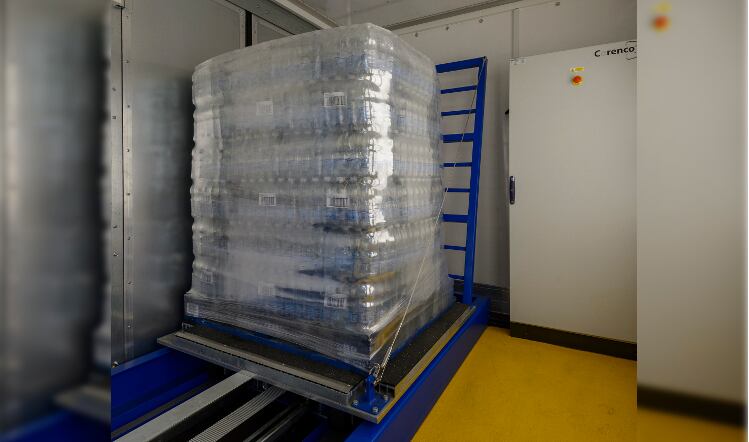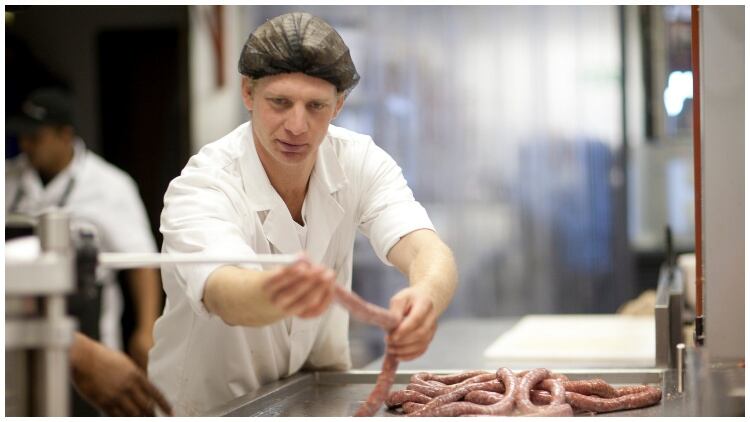Earlier this month, 1430,000 visitors from 156 countries made their way to Düsseldorf to see the latest innovations in packaging. Here we summarise some of the latest launches in this post-event roundup and what the experts consider to be the biggest trends in food and drink packaging today.
TNA sustainable film and augmented reality support
For Eric Geling, chief sales officer at TNA, there are four areas dominating the sector: sustainability, efficiency, digitalisation and automation.
To help food producers address existing and emerging market trends, TNA has designed a range of sustainable film materials on its vertical form fill and seal (VFFS) systems and continues to develop advance software to deliver “tangible sustainable benefits”.
“Our 'Perfect Pair' system, featuring EtherCAT® real-time protocol and an integrated display controller system, provides information from the TNA checkweigher or product in-seal inspection to ensure operators have the best weighing bucket configuration for quick troubleshooting. As a result, snack manufacturers can produce up to 2,800 more bags per line per day with minimal downtime. Our TNA robag® 3e also provides a more efficient, sustainable packaging operation, reducing product waste levels to just 0.1%.”
The brand has also introduced single serration jaws which reduce the consumption of biaxially orientated polypropylene (BOPP), a recyclable but non-biodegradable material.
“This can save up to 5 millimetres of material per seal, translating to 2.26 million bags per month for VFFS systems that produce 150 bags per minute. In a factory with 10 packaging lines operating at least 12 hours a day, this results in nearly 390 kilometres of film saved per month,” commented Geling.
As manufacturers look to increase automation and digitalisation in the food industry, TNA has also introduced smart technologies to optimise production lines and improve product quality, including its TNA remove assist service which uses augmented reality (AR) to enable its engineers to remotely guide machine maintenance, installation, training and servicing in real-time.
“This gives food manufacturers the tailored support they need to keep lines operating smoothly - wherever they are in the world,” said Geling.
While its latest extended reality (XR) technology, coupled with virtual reality (VR) headsets, allows food producers to experience the production line before making any decisions.
Stora Enso focuses on alternative materials and shelf life
Sustainability was also a key focus of Stora Enso, a provider of renewable products in packaging, biomaterials and wooden construction, which announced its latest innovation in bio-based packaging.
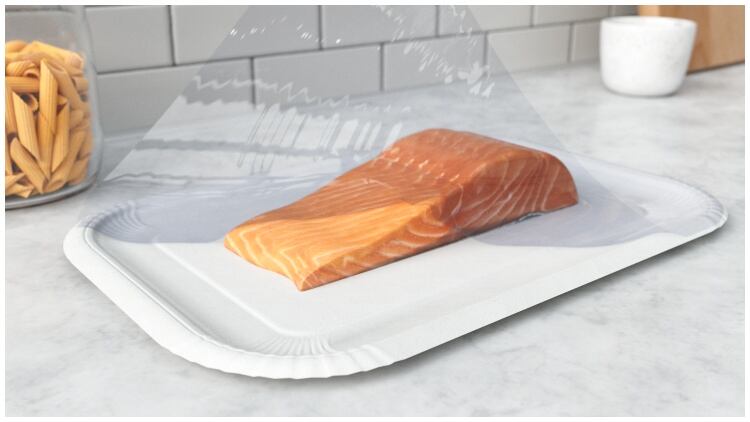
Created in an effort to reduce its plastic and therefore carbon footprint, Trayforma BarrPeel is a new sustainable barrier-coated paperboard pressed tray made from 90% renewable wood fibres. It’s suitable for cold cuts, cheese, meat and fish, and is compatible with vacuum packaging and a polymer skin film to seal the product.
“With Trayforma BarrPeel, we improve environmental performance on two levels: protecting food to provide a longer shelf life, and reducing the share of fossil-based materials,” said Jaana Keskitalo, technical account manager for Trayforma & Barriers at Stora Enso. “We’re especially proud that we can achieve this while also providing a great user experience. This easily peelable tray material lets consumers enjoy their product with minimal effort.”
Mettler-Toledo’s detection portfolio expands
Agreeing with Geling’s thoughts, Ian Robertshaw, global key account manager, Mettler-Toledo Product Inspection, noted sustainability, efficiency and automation has key trends.
“Integrating innovative production line technologies such as product inspection solutions can help improve sustainability by reducing waste, lower manufacturing costs by boosting productivity and increase cost-effectiveness by lowering the Total Cost of Ownership (TCO) of the technology investment,” he stated.
“One of our most exciting recent product launches is the X2 Series, which was unveiled at Interpack. This revolutionary range of x-ray inspection systems comes with state-of-the-art ContamPlus™ software, designed to last longer, perform better and inspect a wide range of foreign body contaminants for optimum performance. Available at an affordable price point, the X2 Series includes two modularly designed models, the X12 High Performance X-ray System, and the X32 Advanced X-ray Solution. Both models feature HiGain detectors that generate sharper images, and deliver outstanding contaminant detection, ultimately resulting in less waste and lower total cost of ownership.”
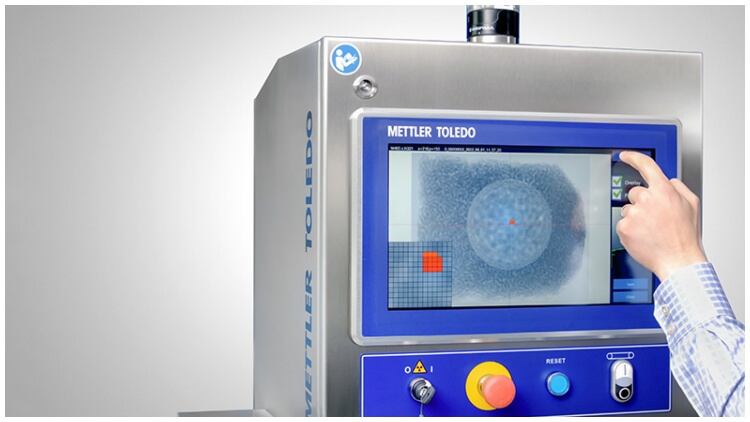
Mettler-Toledo has also released its dual energy detection (DXD and DXD+) solutions, which can be incorporated into the X36 x-ray inspection system.
“This advanced detection technology overcomes previous detection issues and enables the detection of lower-density foreign objects in packaged food such as certain types of plastics and rubber,” explained Robertshaw.
Beyond this, Mettler-Toledo also showcased for the first time, its recently launched 100% automated label inspection solution. This includes the V13 Flat Pack Label Inspection technology. “This powerful system performs complete label inspection checks from the bottom, top, front and back. It is designed to ensure accurate and consistent label placement on every product, eliminating the need for costly rework and reducing waste. By automating the label inspection process, manufacturers can increase efficiency, reduce labour costs and improve product quality,” said Robertshaw.
Its metal detection systems have also seen new features, including the recently launched SENSE™ software enhancement.
“This technology offers increased metal detection protection and performance capabilities, allowing the M30 R-Series metal detection system to bring next-level automation and affordable compliance to manufacturers looking to boost their productivity. With the SENSE™ software, manufacturers can ensure that their metal detection systems are always operating at optimal performance, reducing the risk of costly product recalls and improving product integrity.”
Join Mettler-Toledo in the upcoming webinar: How to meet retailer testing requirements with metal detection
Contamination of foreign materials can happen at any time in the production process and if they occur, the result can be detrimental.
Hosted by market managers Paul Holdship and Rob Stevens, this online session will explore the challenges faced by food producers in contamination detection and meeting retailer testing requirements, particularly in metal detector testing. The webinar will provide valuable insights and advice to help streamline your testing practices for auditing purposes.
The experts will cover the components of modern metal detection systems that support compliance goals; different types of tests, including standard, memory, consecutive and big ball tests; and guidance on digital documentation, storage and recording of test results.
Register here and stay updated with the latest industry standards and best practices.
Premier Forrester takes on plastic pollution
While sustainability is not a new trend, Premier Forrester’s Abi Carter, who works as its sales & marketing executive, said it continues to gain more traction and drive innovation.
“Underneath the sustainability umbrella, we’ve seen greater importance placed on running efficient processes to reduce service consumption in manufacturing, which is inevitably driven by heightened operating costs as well as sustainability awareness,” she said.
“Within packaging, the current key trends are using more recyclable and recycled materials and utilising the right-sized packaging to reduce waste overall. Similarly, there is a heightened interest in biodegradable and compostable materials, with paper becoming a favoured packaging material over plastic as it has better sustainability prospects. In saying that, functionality is still one of the most important things customers and manufacturers care about to ensure the packaging is fit for purpose and customers receive perfect products.
“Individually, all our principal suppliers are tackling sustainability in their own ways. Trikno, Wolf, Oka, and Hildebrand, predominantly focus on creating efficient processes during manufacturing to reduce the amount of energy or water required to operate their machinery. Similarly, Hildebrand’s main objective is to create efficient cleaning solutions. In all their industrial washing machines they recycle water to reduce the energy needed to reheat fresh water and remove the need for excessive water use.
“Specifically in packaging, our Principal, Chocal, is focused on tackling plastic waste contamination. It is well-known that plastic waste is a huge global problem, and around half of all plastic waste originates back to packaging. Therefore, it has been creating innovative technology to reduce plastic waste, not only in its core industries of confectionery and food but across all industries requiring packaging. Its new technology provides packaging solutions that are home-compostable and biodegradable without any micro plastics.”
The Chocal Paper Fibre is based on paper cellulose). It is recyclable and home compostable. It is also compatible with a ba(rrier layer to protect against moisture, fats and oils, and can be printed with sustainable colours and formed into rigid shell packaging as an alternative to traditional aluminium packaging options.
The Chocal Natural Fibre is also based on cellulose and home compostable. It looks transparent like common petrochemical plastic but doesn’t contain any petrochemical plastic. This can also be formed to provide rigid packaging and can be printed in 3D.
Amcor and IMA Ilapak flex a world first
The event also saw Amcor and IMA Ilapak demonstrate what it says is the world’s first variable geometry flow wrapper machine.
The Delta OF-360 X can run any packaging material, from paper-based to complex laminates and recyclable mono-polymer films. This horizontal form fill seal (HFFS) machine addresses the need for manufacturers and packers to switch easily between different substrates at a time when the future of more sustainable packaging is fluid and uncertain.
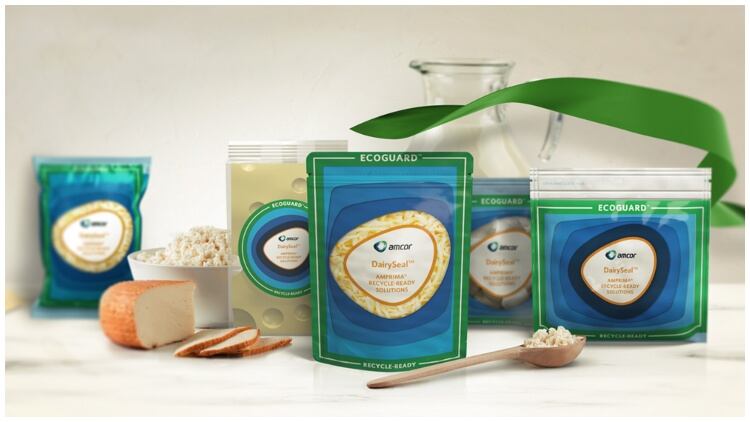
One of the first innovations to run on the Delta OF-360 X was Amcor’s AmPrima® film; a recycle-ready packaging solution for dairy products.
AmPrima® mono-material PE or PP films are designed to be lightweight and flexible, with elevated barrier properties that ensure freshness and quality.
According to Amcor, AmPrima® can assist dairy brands in lowering their packaging’s environmental impact. Compared to standard, non-recyclable dairy packaging, AmPrima® can achieve reductions in non-renewable energy use, lower packaging’s carbon footprint and reduce water consumption.
By switching to AmPrima®, one Amcor dairy customer was able to lower their packaging’s carbon footprint by 41% and water consumption by 11%, the equivalent of turning off 1,640 10-minute showers.
Bühler showcases efficient solutions for wafers, roasting and chocolate
Bühler also had its eyes locked on sustainability. The brand says it has seen an uptick in popularity for wafers and as such has released a new wafer baking plate, which delivers a fusion of stable frame and innovative inlet for exceptional even heat distribution.
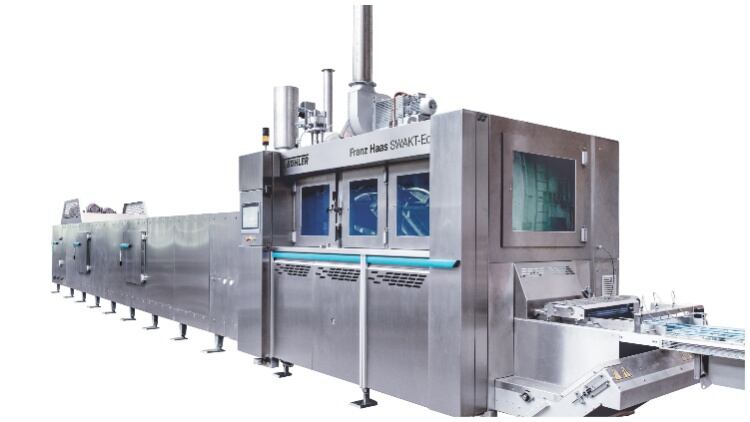
Another highlight was Bühler’s SWAKT-Eco wafer baking oven, a premium solution for the fully automatic industrial production of flat and hollow wafers, designed to reduce gas consumption and emissions. The two electrical tunnel baking ovens - DirectBake E and Turbu E – have been developed to offer a sustainable alternative for the industrial production of biscuits, cookies, crackers and cakes, designed with both product quality and carbon emissions in mind.
Moving to the cocoa, coffee and nuts segment, Bühler presenting its coffee roaster Roastmaster20, which is the first solution to feature Bühler’s new software Playone, a web-based machine control system. With Playone, it is now possible to improve operation with real-time information, increasing monitoring, and adjusting the recipe in a more consistent way.
Finally, for the world of confectionery, Bühler had its ChocoX solution, a chocolate modular moulding line that combines flexibility and agility in production and hygienic design, resulting in significantly lower operational costs.

